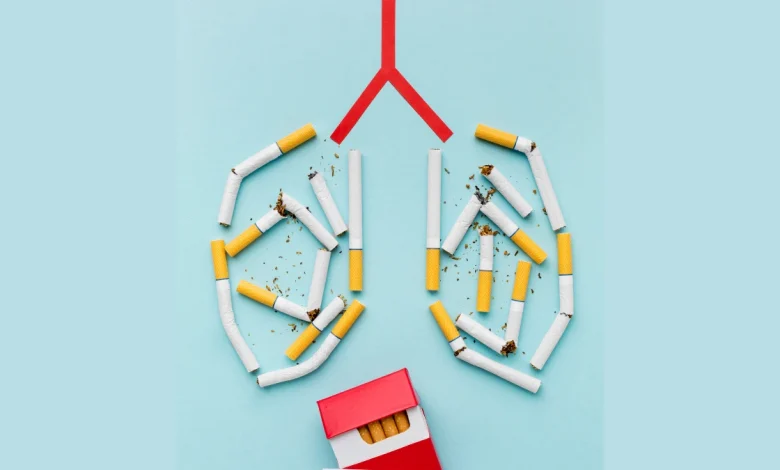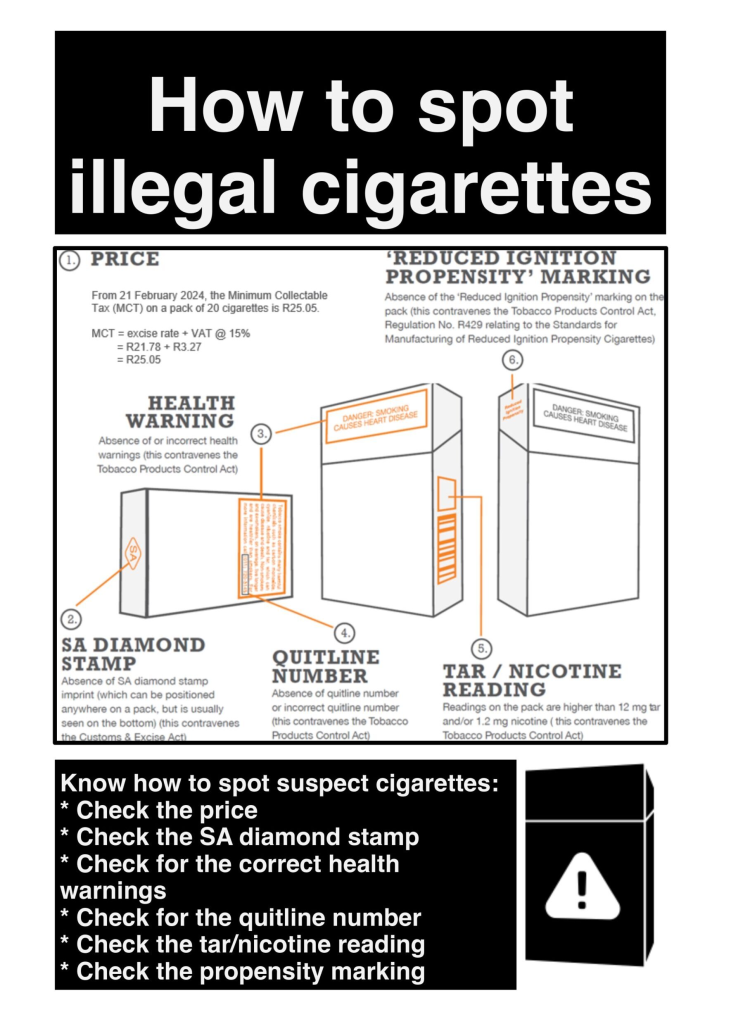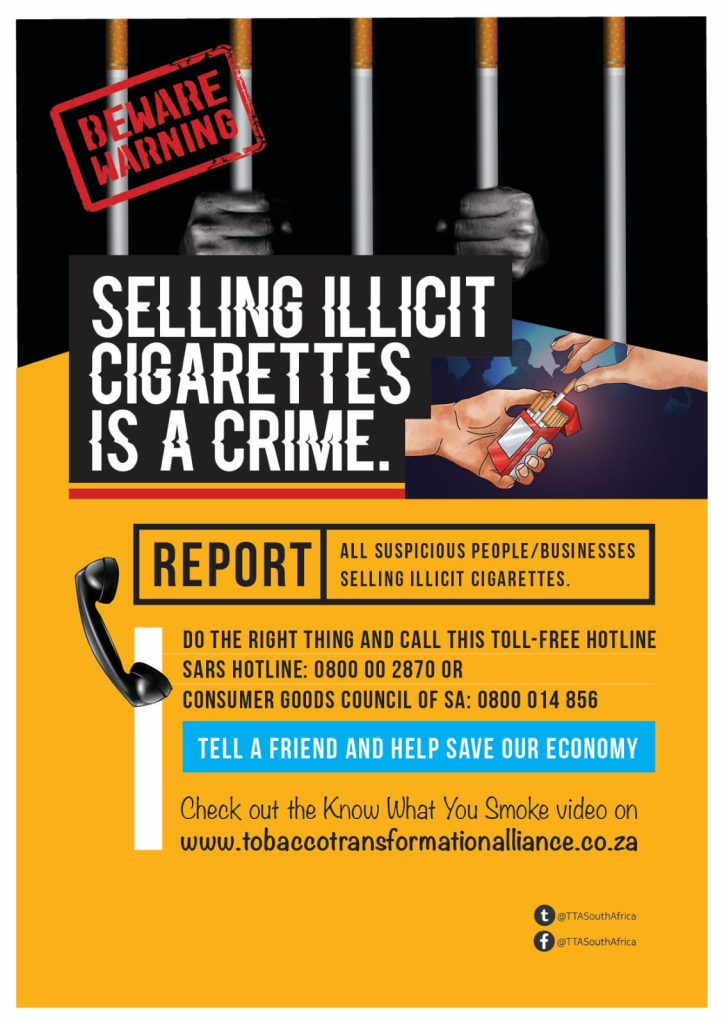The Hidden Dangers: How Illegal Cigarettes Harm Your Lungs More Than You Think

Table of contents
What’s in an Illegal Cigarette?
Illegal cigarettes are part of the illicit tobacco trade, which is rapidly growing in South Africa. This trade accounts for nearly 60% of the national cigarette market. These cigarettes are not subjected to any form of regulation or oversight. As a result, they bypass key quality control measures that protect consumer health.
Unlike legal cigarettes, illegal ones are often produced or distributed outside official supply chains. As a result, manufacturers and distributors bypass safety testing and inspections. The absence of regulatory oversight means these products can contain a variety of harmful contaminants. Illegal cigarettes often contain dangerous substances like: arsenic, lead, ammonia, asbestos, and toxic molds; contaminants that are typically absent from legally manufactured products. Thus, they can significantly damage the lungs when inhaled, causing health issues far worse than those of regular cigarettes.
RELEVANT ARTICLE: SATTA Urges South African Government to Combat R28 Billion Illicit Tobacco Trade
Why Illicit Tobacco Is More Harmful to Your Lungs
The human lungs are especially vulnerable to the toxic chemicals found in illicit cigarettes. Many chemicals found in these products are carcinogenic or contribute to chronic diseases like bronchitis, emphysema, and lung cancer. The danger posed by illegal cigarettes is heightened by several factors.
One key issue is that illicit cigarettes often burn at higher temperatures due to poor construction. As a result, this leads to increased production of tar and carbon monoxide, both of which are harmful to lung tissue and restrict oxygen intake. These contaminants irritate the airways and contribute to chronic respiratory diseases. These include chronic obstructive pulmonary disease (COPD) and asthma.
Moreover, illegal cigarettes tend to lack proper filtration systems. This means more harmful smoke particles penetrate deep into the lung tissue, increasing the risk of serious health issues. Without health warnings on packaging, consumers are less informed about the dangers of these products, which can lead to higher consumption. Over time, this results in increased lung damage.
Legal vs Illegal Cigarettes: A Health Comparison
In South Africa, legal cigarettes are regulated under the Tobacco Products Control Act. This act mandates that cigarette packaging must carry clear health warnings, including graphic images of the health risks associated with smoking. These cigarettes undergo regular testing to ensure they do not contain excessive levels of harmful substances.
Although smoking any type of cigarette remains harmful, legal cigarettes benefit from regulation. This regulation limits exposure to toxic substances. The testing process ensures that harmful chemicals, like arsenic, are kept within safe limits.
In contrast, illegal cigarettes do not comply with any such regulations. Not only do they lack safety filters and health warnings, but they also tend to be sold at much lower prices. This makes them more accessible, especially to youth and lower-income communities. According to the South African Tobacco Transformation Alliance (SATTA), this lack of regulation has led to increased smoking rates. Respiratory diseases are particularly among vulnerable groups.

While legal cigarettes are harmful, they do offer some level of protection. This protection comes through regulation and quality control. Illegal cigarettes, however, pose an even greater risk due to the unpredictability of their contents and the absence of consumer protections.
Dive into the full story to learn how law enforcement is disrupting organized smuggling rings and safeguarding public health. Inside SAPS: How Police Crack Down on Cigarette Smuggling Syndicates. Click to read more!
The Broader Public Health Impact
The consequences of the illicit cigarette market extend beyond individual health. The availability of cheap, unregulated cigarettes fuels a cycle of harm that impacts the community as a whole. Increased tobacco consumption driven by illegal cigarettes leads to higher healthcare costs. As a result, the treatment of respiratory diseases becomes more urgent and expensive. The World Health Organization (WHO) estimates that tobacco use is one of the leading causes of respiratory diseases globally. Furthermore, the proliferation of illegal cigarettes only worsens this issue.
Moreover, the illegal cigarette trade is closely tied to criminal networks. This connection further complicates efforts to combat tobacco-related health issues. The lack of traceability and accountability in illegal cigarette production and sale makes it harder for authorities to enforce regulations. It also hinders their ability to protect public health.

Choose Legal. Report Illegal. Protect Your Lungs.
Illegal cigarettes are more than just a financial or legal issue. They represent a serious risk to public health, particularly when it comes to lung health. Choosing to smoke legal cigarettes, while still hazardous, ensures that the product adheres to safety regulations. These regulations limit harmful exposures and provide essential health warnings to consumers.
To protect your health and the health of others, it is vital to report illegal cigarette sales to authorities. Such authorities include the South African Tobacco Transformation Alliance (SATTA) or local law enforcement. Combating the illicit cigarette trade is an important step toward better respiratory health for all South Africans. Importantly, it strengthens ongoing tobacco control efforts.
Protect your lungs by being informed and making responsible choices. Avoid illegal cigarettes. Your health depends on it.



